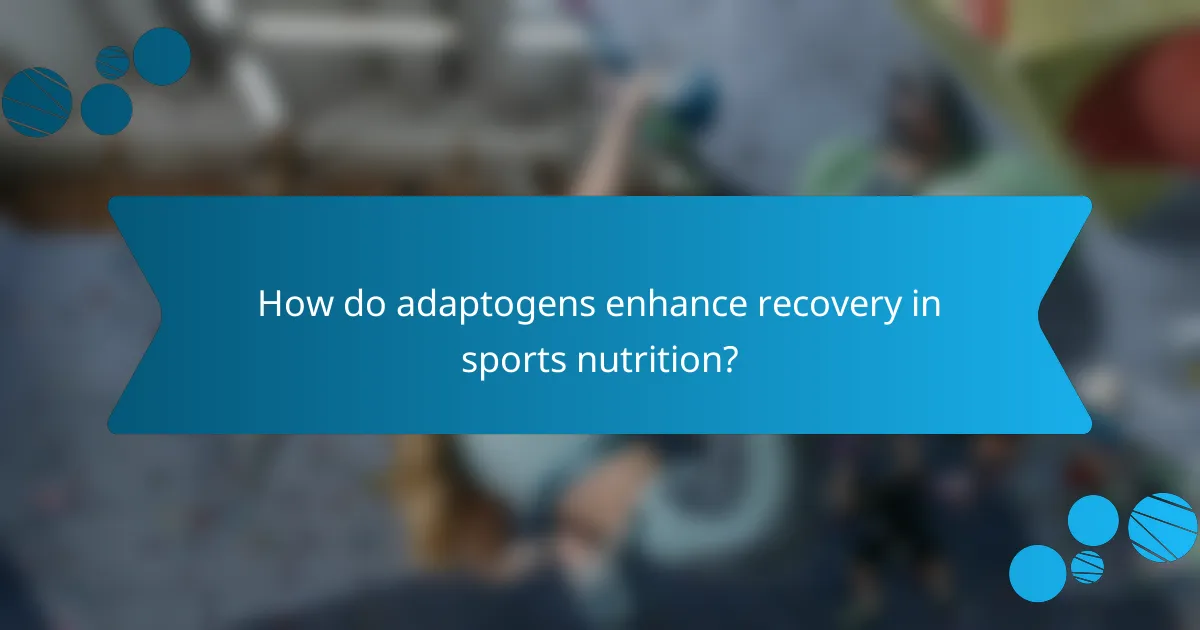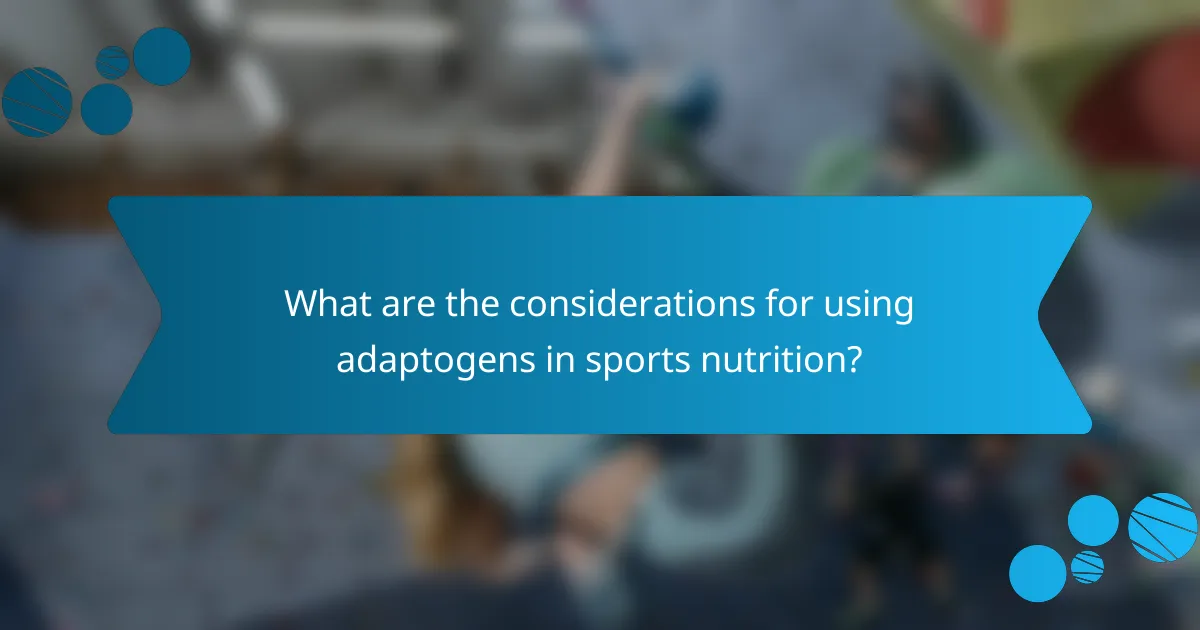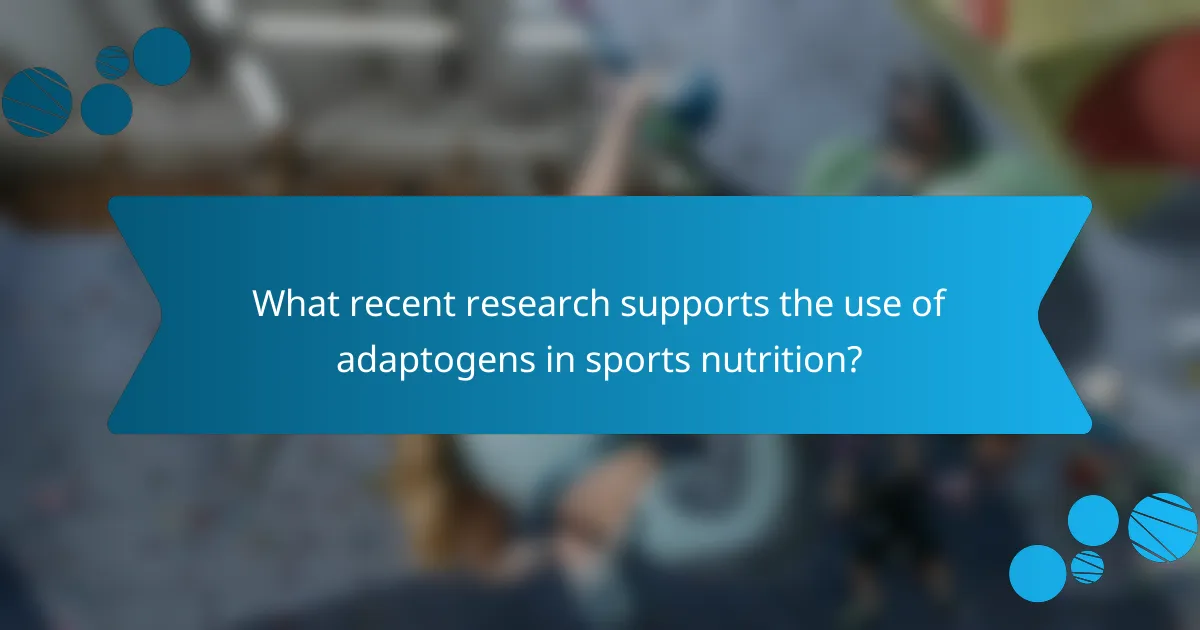Athletes seeking to enhance recovery and reduce stress can benefit from adaptogens. These natural substances help manage cortisol levels, improve resilience, and promote faster recovery. Popular adaptogens like ashwagandha and rhodiola offer unique benefits, whether taken in powders, capsules, teas, or tinctures. Understanding the type, individual responses, and timing of intake can optimize the effects of adaptogens in sports nutrition.

How do adaptogens enhance recovery in sports nutrition?
Adaptogens enhance recovery in sports nutrition by reducing stress and improving resilience. They help athletes manage cortisol levels, promoting faster recovery and better performance. For example, ashwagandha and rhodiola are known for their adaptogenic properties, aiding in fatigue reduction and muscle recovery. These herbs support overall well-being, enabling athletes to train harder and recover efficiently.
What are the key benefits of adaptogens for athletes?
Adaptogens provide athletes with key benefits such as enhanced recovery, reduced stress, and improved performance. These natural substances help regulate the body’s response to stress, leading to faster recovery times and better endurance. Adaptogens like ashwagandha and rhodiola rosea have been shown to lower cortisol levels, which can decrease fatigue and boost overall energy. Additionally, they may improve focus and mental clarity, essential for optimal performance during training and competition.
Which adaptogens are most effective for recovery?
Adaptogens such as ashwagandha, rhodiola, and ginseng are most effective for recovery. These herbs enhance physical performance and reduce stress, aiding in muscle repair and overall recovery.
Ashwagandha is known for its ability to lower cortisol levels, which can improve recovery time. Rhodiola supports endurance and reduces fatigue, making it beneficial post-exercise. Ginseng enhances energy levels and helps combat stress, contributing to quicker recovery.
Including these adaptogens in a sports nutrition regimen can optimize recovery and performance.
How do adaptogens impact muscle repair and inflammation?
Adaptogens positively influence muscle repair and inflammation by enhancing recovery and reducing stress. They regulate cortisol levels, which can mitigate muscle breakdown. For example, ashwagandha and rhodiola rosea have shown promise in decreasing exercise-induced muscle damage and inflammation markers. These adaptogens support faster recovery, enabling athletes to maintain performance levels. Their unique properties make them valuable in sports nutrition, particularly for individuals experiencing high physical stress.
What role do adaptogens play in reducing oxidative stress?
Adaptogens play a significant role in reducing oxidative stress by enhancing the body’s resilience to stressors. They help regulate cortisol levels and improve antioxidant defenses. This adaptation leads to decreased cellular damage and improved recovery in athletes. Studies show that adaptogens like ashwagandha and rhodiola can lower oxidative markers, promoting better overall health and performance.

How can adaptogens help in managing stress for athletes?
Adaptogens can effectively help athletes manage stress by enhancing resilience and promoting recovery. These natural substances, such as ashwagandha and rhodiola, support the body’s stress response and reduce cortisol levels. Studies indicate that adaptogens improve physical performance and mental clarity, allowing athletes to maintain focus during training and competition. By integrating adaptogens into sports nutrition, athletes can experience improved recovery times and reduced fatigue, ultimately leading to better overall performance.
What physiological effects do adaptogens have on stress response?
Adaptogens positively influence the stress response by regulating cortisol levels and enhancing resilience. They help the body adapt to stressors, promoting a balanced physiological state. For instance, ashwagandha has shown a 30% reduction in stress levels in clinical studies. Rhodiola rosea can improve mental performance under stress, enhancing recovery in athletes. These effects contribute to overall well-being and support sports nutrition goals.
Which adaptogens are known for their stress-relieving properties?
Adaptogens known for their stress-relieving properties include ashwagandha, rhodiola rosea, holy basil, and ginseng. These adaptogens help the body manage stress and enhance recovery in sports nutrition.
Ashwagandha is recognized for reducing cortisol levels, promoting relaxation. Rhodiola rosea enhances mental performance and reduces fatigue. Holy basil supports emotional balance and resilience against stress. Ginseng boosts energy and combats stress-related fatigue.
How do adaptogens influence cortisol levels during training?
Adaptogens can lower cortisol levels during training, enhancing recovery and reducing stress. These natural substances, such as ashwagandha and rhodiola, help the body adapt to physical stressors. Research indicates that ashwagandha can reduce cortisol by up to 30%, promoting better performance and recovery. Rhodiola has shown potential in decreasing fatigue and improving endurance, further supporting athletes’ training regimens. By balancing cortisol, adaptogens contribute to overall athletic performance and well-being.

What are the different forms of adaptogens available for athletes?
Athletes can access various forms of adaptogens, including powders, capsules, teas, and tinctures. Each form offers unique benefits for enhancing recovery and reducing stress. Powders provide versatility in mixing with shakes, while capsules offer convenience. Teas can promote relaxation, and tinctures allow for quick absorption. Adaptogens like ashwagandha, rhodiola, and ginseng are popular choices among athletes for their stress-reducing properties.
How do powders, capsules, and teas compare in efficacy?
Powders, capsules, and teas vary in efficacy based on absorption rates and user preferences. Powders often provide faster absorption due to their form, while capsules offer convenience and precise dosing. Teas may enhance relaxation but can have slower effects.
| Form | Absorption Rate | Convenience | Dosing Precision | Additional Benefits |
|————|—————–|————-|——————|—————————–|
| Powders | High | Moderate | Low | Quick recovery boost |
| Capsules | Moderate | High | High | Easy to consume |
| Teas | Low | Low | Low | Calming ritual experience |
Which forms of intake are most popular among athletes?
Athletes commonly prefer adaptogens in forms such as powders, capsules, and teas. Powders offer versatility for mixing into shakes, while capsules provide convenience. Teas are favored for their soothing effects and hydration benefits.

What are the considerations for using adaptogens in sports nutrition?
Using adaptogens in sports nutrition can enhance recovery and reduce stress effectively. Considerations include the type of adaptogen, individual responses, and timing of intake.
1. Type of Adaptogen: Different adaptogens, such as ashwagandha and rhodiola, offer unique benefits. Ashwagandha may improve endurance, while rhodiola can enhance mental performance.
2. Individual Responses: Athletes may react differently to adaptogens. Personal experimentation is crucial to determine the most effective options for enhancing performance.
3. Timing of Intake: Consistent use over time is essential for optimal benefits. Some adaptogens may be more effective when taken before workouts, while others may aid recovery post-exercise.
4. Quality and Source: The purity and sourcing of adaptogens matter. High-quality, sustainably sourced products ensure maximum efficacy and safety.
How should athletes choose the right adaptogen for their needs?
Athletes should select adaptogens based on their specific recovery needs and stress management goals. Consider factors like the adaptogen’s unique properties, such as Rhodiola’s ability to enhance endurance or Ashwagandha’s role in reducing cortisol levels. Additionally, evaluate the form of intake, such as powders or capsules, and consult with a nutritionist for personalized advice.
What potential side effects should athletes be aware of?
Athletes should be aware that adaptogens can cause mild side effects, including gastrointestinal discomfort, headaches, and fatigue. Individual responses vary based on the adaptogen type and dosage. For example, ashwagandha may lead to drowsiness, while rhodiola can cause irritability in some users. Monitoring personal reactions is essential for safe use.

How does the effectiveness of adaptogens vary across different populations?
The effectiveness of adaptogens varies significantly across different populations due to factors like genetics, lifestyle, and stress levels. Research indicates that athletes may experience enhanced recovery and reduced stress from adaptogens like Rhodiola rosea, while sedentary individuals may benefit differently. For example, a study found that elite athletes showed a 30% improvement in recovery times when using adaptogens, compared to a 15% improvement in non-athletic populations. Additionally, age and health status can influence how adaptogens are metabolized and their overall effectiveness.
What unique needs do athletes from various sports have regarding adaptogens?
Athletes from various sports have unique needs regarding adaptogens, focusing on recovery, stress management, and performance enhancement. Endurance athletes benefit from adaptogens like rhodiola for stamina, while strength athletes may prefer ashwagandha for muscle recovery. Team sport athletes often require adaptogens that improve focus and reduce anxiety, such as holy basil. Each sport’s demands shape the specific adaptogens that best support athletes’ performance and recovery processes.
How do cultural perceptions influence the use of adaptogens in sports nutrition?
Cultural perceptions significantly shape the use of adaptogens in sports nutrition by influencing athletes’ beliefs and practices. In cultures that prioritize holistic wellness, adaptogens are viewed as essential for recovery and stress reduction. For instance, in Asian traditions, herbs like ashwagandha are revered for their restorative properties, leading to widespread acceptance among athletes. Conversely, in Western cultures, scientific validation of adaptogens is critical for their integration into sports nutrition. As a result, adaptogens may be embraced more readily in regions where traditional practices are respected alongside modern research. This cultural context ultimately affects the popularity and application of adaptogens in enhancing athletic performance.

What recent research supports the use of adaptogens in sports nutrition?
Recent research supports the use of adaptogens in sports nutrition by demonstrating their effectiveness in enhancing recovery and reducing stress. Studies show that adaptogens like Rhodiola rosea and Ashwagandha can lower cortisol levels and improve physical performance. For instance, a study found that athletes supplementing with Rhodiola experienced reduced fatigue and improved endurance. Another research indicated that Ashwagandha supplementation significantly enhanced muscle strength and recovery time. These findings underline the potential of adaptogens to optimize athletic performance and well-being.
Which studies highlight the benefits of adaptogens for athletic performance?
Studies show that adaptogens can improve athletic performance by enhancing recovery and reducing stress. Research indicates that adaptogens like Rhodiola rosea and Ashwagandha can lower cortisol levels, leading to better endurance and reduced fatigue. For example, a study published in the Journal of Sports Medicine found that athletes supplementing with Rhodiola experienced significant improvements in exercise performance and recovery times. Another study in the Journal of the International Society of Sports Nutrition highlighted Ashwagandha’s role in increasing muscle strength and size in resistance-trained individuals. These findings suggest that incorporating adaptogens into sports nutrition can provide valuable benefits for athletes.
What are the future trends in adaptogen research for athletes?
Future trends in adaptogen research for athletes focus on personalized nutrition and enhanced formulations. Researchers aim to identify specific adaptogens that optimize individual recovery and stress reduction. Innovations may include combining multiple adaptogens for synergistic effects. Additionally, advancements in bioavailability will improve the absorption of these compounds, enhancing their efficacy in sports nutrition. Studies are likely to explore the long-term benefits of adaptogens on athletic performance and mental resilience.
How can athletes integrate adaptogens into their training regimens effectively?
Athletes can effectively integrate adaptogens into their training by incorporating specific herbs into their daily routines. Start with ashwagandha for its stress-reducing properties, which can enhance recovery. Rhodiola rosea may improve endurance and reduce fatigue during workouts. Incorporate these adaptogens in smoothies, teas, or supplements, ensuring consistent intake for optimal benefits. Monitor performance and recovery metrics to assess their impact on training.
What are best practices for using adaptogens in sports nutrition?
To effectively use adaptogens in sports nutrition, prioritize quality sourcing and timing of intake. Select adaptogens like ashwagandha and rhodiola for their proven benefits in stress reduction and recovery enhancement. Incorporate them into pre-workout or post-workout routines for optimal effects. Monitor individual responses to tailor dosages accordingly, ensuring alignment with personal performance goals.